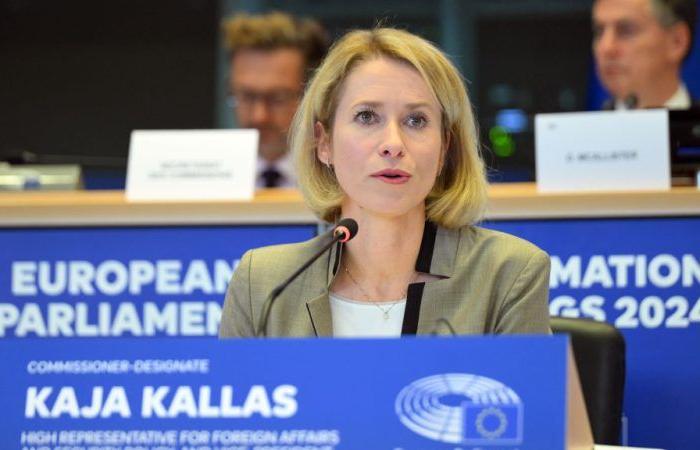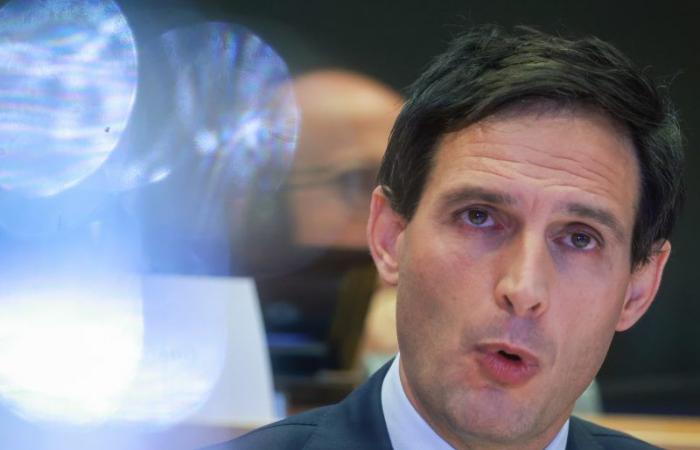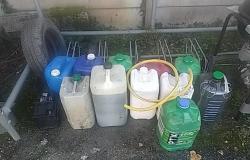Kaja Kallas, nominated candidate for the post of High Representative of the European Union (EU), called on Tuesday November 12 for a strengthening of ties between Brussels and Washington in terms of security, to confront China and Russia, but she remained very evasive on the policy she intended to pursue in the Middle East.
“The world is on fire, so we have to stick together”said Kaja Kallas, emphasizing the need for the EU to exert all its weight as a“geopolitical actor”.
There was little doubt about the Estonian candidate's endorsement since she was directly selected by EU leaders last July. However, on Tuesday afternoon, she was involved in the “hostage taking” policy of his fellow commissioners designated to an executive vice-presidency.
Although her diplomatic responses on most major issues pleased MEPs – notably on Russia and China – she failed to present concrete developments on the Middle East and other regions of the world, according to several sources within Parliament.
Strong on the Russia-China axis
“We see Iran, North Korea, China and Russia aligning in ways that support Russia in Ukraine and extend to Iran's destabilizing actions in the Middle East and even Europe, as in Sweden »Kaja Kallas said.
“If the United States is concerned about events in the South China Sea, it should also prioritize how we respond to Russia's aggression in Ukraine — that also aligns with its interests”she said, urging Donald Trump to strengthen security ties between the EU and the United States.
She emphasized that “Without China’s support, Russia would not be able to continue its war with the same force” and that Beijing “must also pay a high price” for its support for Russia in Ukraine, without giving more details on the nature of this award.
Likewise, the EU “should have a new approach towards Iran”according to the Estonian politician, who pledged to submit the issue to EU foreign ministers in order to discuss a “stronger plan” towards Tehran, accused of supplying military equipment to Moscow.
However, when asked whether she planned to review the EU's strategy towards China, Kaja Kallas did not answer in the affirmative: “We have established our own policy towards China and we must follow it. We need to treat China more as a competitor and a systemic rival, we really need to de-risk.”
However, she stressed that the EU “should not underestimate its own power, because we also have leverage in the relationship with China, since we are a huge economic power.”
When asked if she would conclude the EU-Mercosur trade deal with Latin American countries, Kaja Kallas focused on China, arguing that between 2020 and 2022, Chinese investments in the region Mercosur had increased 34-fold.
“If we don't make a trade deal with them [l’Amérique latine]this void will be filled by China,” she said.
Contrary to the written answers she gave to MEPs, Kaja Kallas did not discuss the EU's economic security strategy or efforts towards a new “foreign economic policy”which would protect the EU from its “systemic rivals”.
EU-NATO Defense Division
Addressing the “significant underinvestment” of Europe in matters of defence, Kaja Kallas declared that “The problem with defense is that when it is needed, it is actually too late to make the decisions — we must prepare now, while we are at peace.”
Asked how she plans to ensure EU complementarity with NATO in defense matters, the Estonian said she considers that “the European Union and NATO had two different roles”with Brussels focusing on the defense industry and the Defense Alliance itself.
“I don’t think the EU needs separate military powers”said Kaja Kallas, putting an end to federalist ideas of a future European army. “If we have two parallel structures, the ball will fall between the two chairs, and we don't need that.”
Weakness on the Middle East and other regions
While Kaja Kallas' hearing was largely dominated by Russia — and to a lesser extent by China — MEPs also pressed the Estonian to clarify her views on other subjects on which her responses were limited. less clear.
Regarding the Middle East, she expressed the “strong unity” of the EU on the need for an immediate ceasefire in Gaza and Lebanon, the unconditional release of Israeli hostages, the continuation of humanitarian aid and support for a two-state solution.
“With our support for the Palestinian Authority and Israel's right to exist recognized throughout the region, we have a solid basis for diplomatic efforts to end the conflict”she confided.
However, she struggled to strike a confident tone on the EU's overall approach to the Middle East or to mention the United Nations Relief and Works Agency for Palestine Refugees in the Near East (UNRWA). , which is financed by the Union and which Israel has threatened to ban.
She also did not specify whether she would suspend the association agreement between the EU and Israel, which Josep Borrell, the current head of EU diplomacy, is due to submit for discussion at his last meeting of the EU foreign ministers in mid-November.
Kaja Kallas also failed to convince MEPs with her plea for engagement with African countries. She promised to use a joint summit next year to “listen to African leaders, and not just to preach our way of life”.
“I am ready to invest my time in Africa”she said. ” We [l’Estonie] we have no past [en Afrique]so I am a new face »she added, but she remained very vague on the content of the policy she wanted to put in place in the region, beyond the fight against immigration.
[Édité par Anna Martino]







